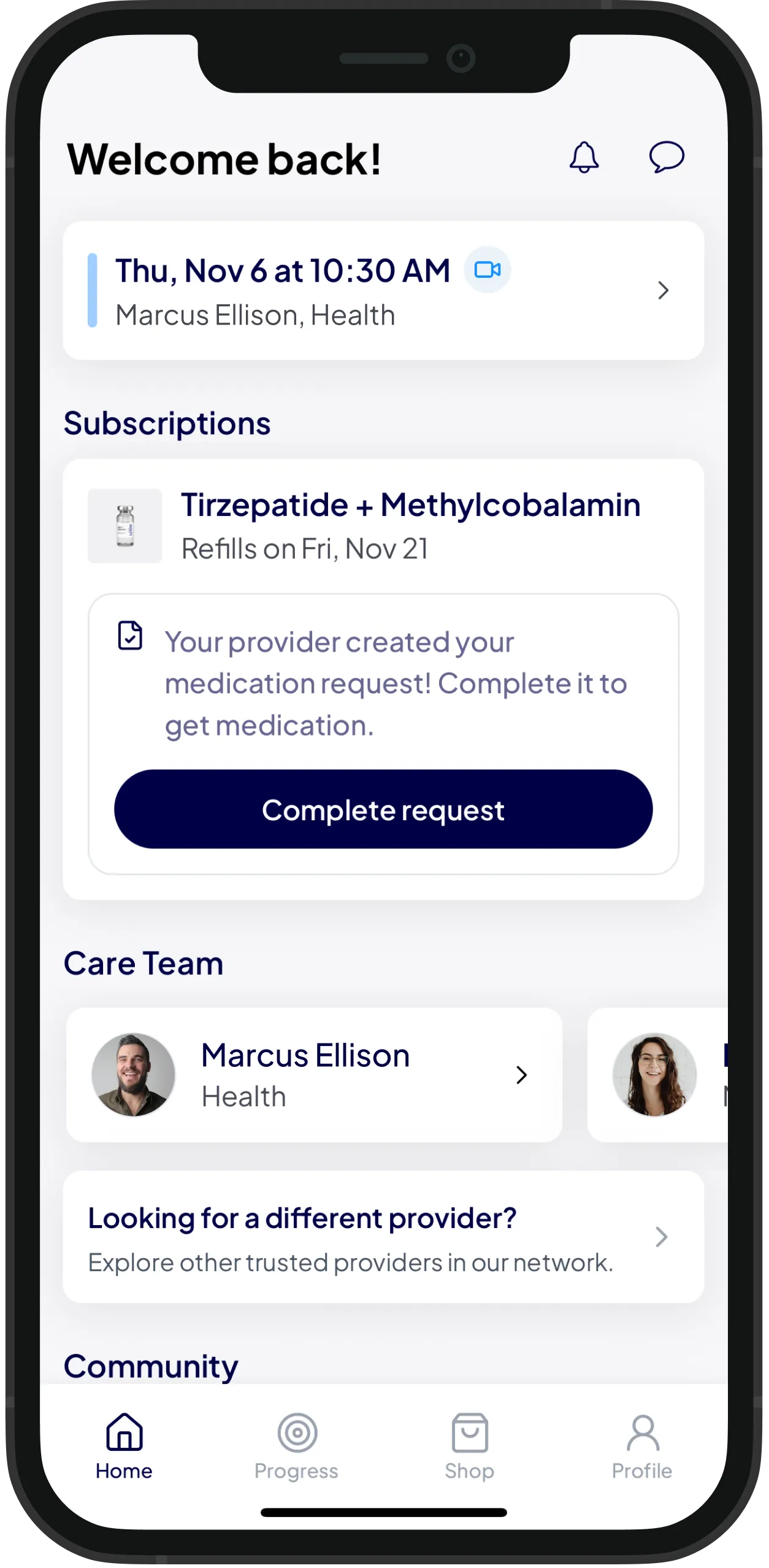Ready to transform your health?
Unlock access to expert guidance and a weight care plan crafted just for you.
Ready to transform your health?
Unlock access to expert guidance and a weight care plan crafted just for you.
Similar Articles
Similar Articles


GLP-1s for Athletes: Performance, Body Composition, and Recovery
GLP-1s for Athletes: Performance, Body Composition, and Recovery


What Labs Should You Monitor on GLP-1s? A Complete Biomarker Guide
What Labs Should You Monitor on GLP-1s? A Complete Biomarker Guide


Does Semaglutide Affect Fertility or Pregnancy?
Does Semaglutide Affect Fertility or Pregnancy?
Ideal Protein for Weight Loss: Everything You Need to Know
Ideal Protein for Weight Loss: Everything You Need to Know
Ideal Protein for Weight Loss: Everything You Need to Know
Protein is an essential macronutrient that plays a crucial role in weight loss and overall health. Know about the ideal protein for weight loss in this blog
Protein is an essential macronutrient that plays a crucial role in weight loss and overall health. Know about the ideal protein for weight loss in this blog
Protein is an essential macronutrient that plays a crucial role in weight loss and overall health. Know about the ideal protein for weight loss in this blog



Table of Contents
Table of Contents
Table of Contents
Overview: Why Are Proteins Important Nutrient
Why is Maintaining Your Protein Intake Crucial for Weight Loss?
Recommended Protein Consumption
What happens when you eat a high-protein diet?
How to Incorporate More Protein Into Your Diet?
Overview: Why Are Proteins Important Nutrient
Why is Maintaining Your Protein Intake Crucial for Weight Loss?
Recommended Protein Consumption
What happens when you eat a high-protein diet?
How to Incorporate More Protein Into Your Diet?
Overview: Why Are Proteins Important Nutrient
Why is Maintaining Your Protein Intake Crucial for Weight Loss?
Recommended Protein Consumption
What happens when you eat a high-protein diet?
How to Incorporate More Protein Into Your Diet?
Overview: Why Are Proteins Important Nutrient
Protein is an essential macronutrient that plays a crucial role in weight loss and overall health. It is a major component of every cell in the body and is necessary for the production of enzymes, hormones, and other molecules. Protein is also important for maintaining muscle mass and aiding in recovery after physical activity. With that in mind, consuming the appropriate amount of protein is important to support weight loss goals and muscle maintenance or growth!
Proteins are the building blocks of life. Every cell in the human body contains protein. The basic structure of protein is a chain of amino acids. You need protein in your diet to help your body repair cells and make new ones.

Photo: Cedars-Sinai
Why is Maintaining Your Protein Intake Crucial for Weight Loss?
There are many reasons to take care of your diet and eat a balanced diet, but when it comes to weight loss, taking care of your food intake and nutrient portions is highly important because:
First, we know that while exercise is important, a person’s healthy eating habits likely matter more for weight loss than the hours they spend in the gym.
Second, when it comes to dieting, there are only so many best ones for losing weight; many diets can work quite well as long as the total calorie balance is accounted for.
Third, dietary protein is one of the key “levers” in a diet that increases the likelihood of someone’s ability to lose weight.
Recommended Protein Consumption
According to the National Academy of Medicine, the recommended daily protein intake for adults is 0.8 grams per kilogram of body weight. For example, a person weighing 150 pounds (68 kilograms) should consume about 55 grams of protein daily. However, more than this recommendation may be required for individuals trying to lose weight. Increasing the percentage of protein in your diet is a great way to keep you full longer and provide sustainable energy for physical activity. Some studies have even suggested that high-protein diets can improve insulin sensitivity (the hormone that helps your body use the sugar in your blood for fuel), dyslipidemia (high cholesterol), and inflammation.
What happens when you eat a high-protein diet?
A systematic review study published in the European Journal of Nutrition in 2020 reviewed ten articles and 1,079 patients and found that participants experienced enhanced fullness or satiety on a high-protein diet in most of those studies. The length of the studies largely varied, but the longest intervention, 34 months, revealed a reduction in hunger sensation with longer-term high-protein diets. The most pronounced results were seen in high protein diets, where 39% of daily calories were protein.
Another study published in the Journal of Nutrition and Metabolism found that high protein diets that contained between 1.2 – 1.6 grams of protein per kilogram of body weight yielded improvements in appetite, body weight management, and cardiometabolic risk factors compared to lower-protein diets.
How to Incorporate More Protein Into Your Diet?
A high protein intake offers several potential health benefits and could help increase weight loss, enhance muscle growth, and improve overall health. While increasing protein intake for weight loss, consider consuming protein from a variety of sources to avoid palate fatigue and maintain your goals. Lean sources of protein such as chicken, turkey, fish, and tofu are great and yield the highest amounts of protein per serving.
Peanut butter is another delicious and high-protein food with a creamy texture that pairs well with various ingredients. Peanut butter may be associated with several health benefits and could decrease appetite, increase fat burning, and reduce blood sugar levels.
Peanut butter can also boost the flavor and nutritional value of firm fruits like apples and pears, which are rich in fiber and antioxidants yet low in protein.
Other non-meat foods that pack a punch in the protein department include edamame, lentils, cottage cheese, eggs, Greek yogurt, and chickpeas. It is also important to consume protein in combination with other nutrients, such as fibre and healthy fats. Parfait, anyone?

Photo: Cascadian Farms
Conclusion
In conclusion, protein is an essential macronutrient that plays a crucial role in weight loss and overall health. It is important to consume protein from a variety of sources and in combination with other nutrients to support overall health. Consuming the appropriate amount of protein can lead to greater weight loss and fat loss.
Sources
"Dietary Reference Intakes for Energy, Carbohydrate, Fiber, Fat, Fatty Acids, Cholesterol, Protein, and Amino Acids." National Academy of Medicine, https://nap.nationalacademies.org/read/10490/chapter/8.
de Carvalho KMB, Pizato N, Botelho PB, Dutra ES, Gonçalves VSS. Dietary protein and appetite sensations in individuals with overweight and obesity: a systematic review. Eur J Nutr. 2020;59(6):2317-2332. doi:10.1007/s00394-020-02321-1.
Leidy HJ, Clifton PM, Astrup A, et al. The role of protein in weight loss and maintenance. Am J Clin Nutr. 2015;101(6):1320S-1329S. doi:10.3945/ajcn.114.084038
Overview: Why Are Proteins Important Nutrient
Protein is an essential macronutrient that plays a crucial role in weight loss and overall health. It is a major component of every cell in the body and is necessary for the production of enzymes, hormones, and other molecules. Protein is also important for maintaining muscle mass and aiding in recovery after physical activity. With that in mind, consuming the appropriate amount of protein is important to support weight loss goals and muscle maintenance or growth!
Proteins are the building blocks of life. Every cell in the human body contains protein. The basic structure of protein is a chain of amino acids. You need protein in your diet to help your body repair cells and make new ones.

Photo: Cedars-Sinai
Why is Maintaining Your Protein Intake Crucial for Weight Loss?
There are many reasons to take care of your diet and eat a balanced diet, but when it comes to weight loss, taking care of your food intake and nutrient portions is highly important because:
First, we know that while exercise is important, a person’s healthy eating habits likely matter more for weight loss than the hours they spend in the gym.
Second, when it comes to dieting, there are only so many best ones for losing weight; many diets can work quite well as long as the total calorie balance is accounted for.
Third, dietary protein is one of the key “levers” in a diet that increases the likelihood of someone’s ability to lose weight.
Recommended Protein Consumption
According to the National Academy of Medicine, the recommended daily protein intake for adults is 0.8 grams per kilogram of body weight. For example, a person weighing 150 pounds (68 kilograms) should consume about 55 grams of protein daily. However, more than this recommendation may be required for individuals trying to lose weight. Increasing the percentage of protein in your diet is a great way to keep you full longer and provide sustainable energy for physical activity. Some studies have even suggested that high-protein diets can improve insulin sensitivity (the hormone that helps your body use the sugar in your blood for fuel), dyslipidemia (high cholesterol), and inflammation.
What happens when you eat a high-protein diet?
A systematic review study published in the European Journal of Nutrition in 2020 reviewed ten articles and 1,079 patients and found that participants experienced enhanced fullness or satiety on a high-protein diet in most of those studies. The length of the studies largely varied, but the longest intervention, 34 months, revealed a reduction in hunger sensation with longer-term high-protein diets. The most pronounced results were seen in high protein diets, where 39% of daily calories were protein.
Another study published in the Journal of Nutrition and Metabolism found that high protein diets that contained between 1.2 – 1.6 grams of protein per kilogram of body weight yielded improvements in appetite, body weight management, and cardiometabolic risk factors compared to lower-protein diets.
How to Incorporate More Protein Into Your Diet?
A high protein intake offers several potential health benefits and could help increase weight loss, enhance muscle growth, and improve overall health. While increasing protein intake for weight loss, consider consuming protein from a variety of sources to avoid palate fatigue and maintain your goals. Lean sources of protein such as chicken, turkey, fish, and tofu are great and yield the highest amounts of protein per serving.
Peanut butter is another delicious and high-protein food with a creamy texture that pairs well with various ingredients. Peanut butter may be associated with several health benefits and could decrease appetite, increase fat burning, and reduce blood sugar levels.
Peanut butter can also boost the flavor and nutritional value of firm fruits like apples and pears, which are rich in fiber and antioxidants yet low in protein.
Other non-meat foods that pack a punch in the protein department include edamame, lentils, cottage cheese, eggs, Greek yogurt, and chickpeas. It is also important to consume protein in combination with other nutrients, such as fibre and healthy fats. Parfait, anyone?

Photo: Cascadian Farms
Conclusion
In conclusion, protein is an essential macronutrient that plays a crucial role in weight loss and overall health. It is important to consume protein from a variety of sources and in combination with other nutrients to support overall health. Consuming the appropriate amount of protein can lead to greater weight loss and fat loss.
Sources
"Dietary Reference Intakes for Energy, Carbohydrate, Fiber, Fat, Fatty Acids, Cholesterol, Protein, and Amino Acids." National Academy of Medicine, https://nap.nationalacademies.org/read/10490/chapter/8.
de Carvalho KMB, Pizato N, Botelho PB, Dutra ES, Gonçalves VSS. Dietary protein and appetite sensations in individuals with overweight and obesity: a systematic review. Eur J Nutr. 2020;59(6):2317-2332. doi:10.1007/s00394-020-02321-1.
Leidy HJ, Clifton PM, Astrup A, et al. The role of protein in weight loss and maintenance. Am J Clin Nutr. 2015;101(6):1320S-1329S. doi:10.3945/ajcn.114.084038
Overview: Why Are Proteins Important Nutrient
Protein is an essential macronutrient that plays a crucial role in weight loss and overall health. It is a major component of every cell in the body and is necessary for the production of enzymes, hormones, and other molecules. Protein is also important for maintaining muscle mass and aiding in recovery after physical activity. With that in mind, consuming the appropriate amount of protein is important to support weight loss goals and muscle maintenance or growth!
Proteins are the building blocks of life. Every cell in the human body contains protein. The basic structure of protein is a chain of amino acids. You need protein in your diet to help your body repair cells and make new ones.

Photo: Cedars-Sinai
Why is Maintaining Your Protein Intake Crucial for Weight Loss?
There are many reasons to take care of your diet and eat a balanced diet, but when it comes to weight loss, taking care of your food intake and nutrient portions is highly important because:
First, we know that while exercise is important, a person’s healthy eating habits likely matter more for weight loss than the hours they spend in the gym.
Second, when it comes to dieting, there are only so many best ones for losing weight; many diets can work quite well as long as the total calorie balance is accounted for.
Third, dietary protein is one of the key “levers” in a diet that increases the likelihood of someone’s ability to lose weight.
Recommended Protein Consumption
According to the National Academy of Medicine, the recommended daily protein intake for adults is 0.8 grams per kilogram of body weight. For example, a person weighing 150 pounds (68 kilograms) should consume about 55 grams of protein daily. However, more than this recommendation may be required for individuals trying to lose weight. Increasing the percentage of protein in your diet is a great way to keep you full longer and provide sustainable energy for physical activity. Some studies have even suggested that high-protein diets can improve insulin sensitivity (the hormone that helps your body use the sugar in your blood for fuel), dyslipidemia (high cholesterol), and inflammation.
What happens when you eat a high-protein diet?
A systematic review study published in the European Journal of Nutrition in 2020 reviewed ten articles and 1,079 patients and found that participants experienced enhanced fullness or satiety on a high-protein diet in most of those studies. The length of the studies largely varied, but the longest intervention, 34 months, revealed a reduction in hunger sensation with longer-term high-protein diets. The most pronounced results were seen in high protein diets, where 39% of daily calories were protein.
Another study published in the Journal of Nutrition and Metabolism found that high protein diets that contained between 1.2 – 1.6 grams of protein per kilogram of body weight yielded improvements in appetite, body weight management, and cardiometabolic risk factors compared to lower-protein diets.
How to Incorporate More Protein Into Your Diet?
A high protein intake offers several potential health benefits and could help increase weight loss, enhance muscle growth, and improve overall health. While increasing protein intake for weight loss, consider consuming protein from a variety of sources to avoid palate fatigue and maintain your goals. Lean sources of protein such as chicken, turkey, fish, and tofu are great and yield the highest amounts of protein per serving.
Peanut butter is another delicious and high-protein food with a creamy texture that pairs well with various ingredients. Peanut butter may be associated with several health benefits and could decrease appetite, increase fat burning, and reduce blood sugar levels.
Peanut butter can also boost the flavor and nutritional value of firm fruits like apples and pears, which are rich in fiber and antioxidants yet low in protein.
Other non-meat foods that pack a punch in the protein department include edamame, lentils, cottage cheese, eggs, Greek yogurt, and chickpeas. It is also important to consume protein in combination with other nutrients, such as fibre and healthy fats. Parfait, anyone?

Photo: Cascadian Farms
Conclusion
In conclusion, protein is an essential macronutrient that plays a crucial role in weight loss and overall health. It is important to consume protein from a variety of sources and in combination with other nutrients to support overall health. Consuming the appropriate amount of protein can lead to greater weight loss and fat loss.
Sources
"Dietary Reference Intakes for Energy, Carbohydrate, Fiber, Fat, Fatty Acids, Cholesterol, Protein, and Amino Acids." National Academy of Medicine, https://nap.nationalacademies.org/read/10490/chapter/8.
de Carvalho KMB, Pizato N, Botelho PB, Dutra ES, Gonçalves VSS. Dietary protein and appetite sensations in individuals with overweight and obesity: a systematic review. Eur J Nutr. 2020;59(6):2317-2332. doi:10.1007/s00394-020-02321-1.
Leidy HJ, Clifton PM, Astrup A, et al. The role of protein in weight loss and maintenance. Am J Clin Nutr. 2015;101(6):1320S-1329S. doi:10.3945/ajcn.114.084038
Read next
Ready to transform your health?
Unlock access to expert guidance and a weight care plan crafted just for you.

Ready to transform your health?
Unlock access to expert guidance and a weight care plan crafted just for you.

Ready to transform your health?
Unlock access to expert guidance and a weight care plan crafted just for you.


© 2026 Mochi Health
All professional medical services are provided by licensed physicians and clinicians affiliated with independently owned and operated professional practices. Mochi Health Corp. provides administrative and technology services to affiliated medical practices it supports, and does not provide any professional medical services itself.


© 2026 Mochi Health
All professional medical services are provided by licensed physicians and clinicians affiliated with independently owned and operated professional practices. Mochi Health Corp. provides administrative and technology services to affiliated medical practices it supports, and does not provide any professional medical services itself.


© 2026 Mochi Health
All professional medical services are provided by licensed physicians and clinicians affiliated with independently owned and operated professional practices. Mochi Health Corp. provides administrative and technology services to affiliated medical practices it supports, and does not provide any professional medical services itself.


















